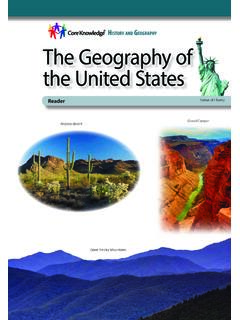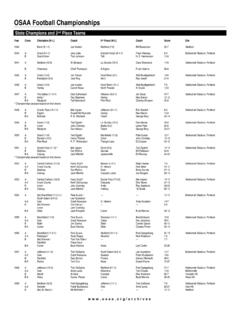Transcription of CHAPTER ONE BIBLIOLOGY AND CANONIZATION
1 1 CHAPTER ONE BIBLIOLOGY AND CANONIZATION When it comes to studying the Bible, the first questions to ask are, Is the Bible worth studying? and Is this the right Bible? These questions form the heart of BIBLIOLOGY the study of the Bible. The information on which one bases life is an important decision that should be approached with scrutiny. If a person were to base his or her diet off of what was seen on TV during the Super Bowl, that person s physical health would rapidly decline. In this same way, if someone were to form his or her life s principles off a few catchy phrases, that person s mental, physical and spiritual health could all crumble.
2 The first question, Is the Bible worth studying? stems from a person s view of God. A God who is loving would likely desire relationship, a vehicle through which His love could flow. This desire for relationship is proven by the work of Christ. God sent His son to die so that the broken relationship with mankind would be restored. If God so desires relationship, mankind can assume He has the wisdom to use the tool that nourishes relationship: communication. The premise just made is illustrated in the following line. God is love > love requires relationship > relationship requires communication > God communicates Having established that God communicates, the next step is to establish our response to it.
3 Simply put, if God is communicating, are humans listening? If the all-knowing, all-loving God puts forth the effort to communicate, we would be wise to position ourselves to receive the communique which is the Bible. From this base, one can assert the Bible is in fact worth studying, assuming the text is correct. As Millard Erickson writes in Christian Theology, written record, to the extent that it is an accurate reproduction of the original revelation, is also by derivation revelation and entitled to be called that. In essence, Erickson is saying, If the text accurately records what God said and did, it has the same importance on paper as it did when God said or did it.
4 So now, the question is whether or not the Bible as it exists today is in fact a good account of what God has said and done. The answer to this question will be broken into two sections: the CANONIZATION of the Old Testament, and the CANONIZATION of the New Testament. CANONIZATION of the Old Testament CANONIZATION is the process by which the books of the Bible were discovered as authoritative. Men did not canonize Scripture; men simply recognized the authority of the books that God inspired. The foundation of the Old Testament (and the entire Bible) is the Pentateuch.
5 These are the first five books positioned in the Old Testament. The strongest evidence for the validity of the Pentateuch is the history and traditions of Israel. These five books were written by Moses at the beginning of Israel s history after the Exodus from Egypt. These writings were the ruling documents for Israel, rather like the Constitution is the ruling document for the United States of America. The history and existence of America validates the Constitution; so too does the history and existence of Israel validate the Pentateuch.
6 So the issue of the Pentateuch being Moses words from God to Israel is no more of a question than the Constitution being the founding father s words from their hearts and minds to the government. After the Pentateuch comes the Histories and the Poetic/Wisdom literature. These texts were believed to have been canonized alongside the Pentateuch by the scribe Ezra. Their content can be trusted because the prophets trusted and used them. The Pentateuch set up the office of the prophets as the mouthpiece 2 of God who faithfully declared the revelation that came from God Himself.
7 If Ezra had erred in his CANONIZATION of scripture, God would have corrected this through the prophets who came after his time. The writings of the prophets were the last addition to the Old Testament, having been in the canon for several centuries before the time of Jesus. He puts the final stamp of approval on the Old Testament. Jesus quoted the Old Testament with frequency and surety indicating His approval of it. Jesus then takes it one step beyond this in Matthew 22:40 by grouping all the law and the prophets together as a valid basis on which to hang the two great love commandments.
8 Jesus completely affirms the Old Testament sections in Luke 24:44. CANONIZATION of the New Testament The CANONIZATION of the New Testament was built upon the CANONIZATION of the Old Testament. When looking at how the Old Testament was canonized, the councils that decided upon the New Testament canon pulled out a few key principles (some of which have already been touched on): Does this text come with the established weight of approval from those who were around when it was written? Does this text directly refer to God as its authority?
9 Does this text fall in line with/build upon the other texts in canon? The books that comprise what is now the New Testament passed these tests with flying colors. Other texts may have been considered to have beneficial content, but they were not to be put on the same level of the Old Testament scriptures. From this step of the CANONIZATION process comes one last question: Is the Bible complete, or shall more scripture be added later? Wayne Grudem in Systematic Theology has this to say: The New Testament writings contain the final, authoritative, and sufficient interpretation of Christ s work of redemption.
10 The apostles and their close companions report Christ s words and deeds and interpret them with absolute divine authority. When they have finished their writing, there is no more to be added with the same absolute divine authority. Thus, once the writings of the New Testament apostles and their authorized companions are completed, we have in written form the final record of everything that God wants us to know about the life, death, and resurrection of Christ, and its meaning for the lives of believers for all time. Since this is God s greatest revelation for mankind, no more is to be expected once this is complete.




